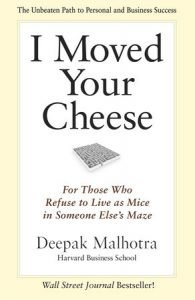 By Deepak Malhotra
By Deepak Malhotra
ISBN-13 — 978-1-60671-399-0
Publication Year: 2013
Tags: Social Commentary, Business, Self-Determination
Rating: ★★★★☆
Mice who live in the maze are taught that, if someone moves your cheese, you go out into the maze to find more cheese. From an early age, Max asked questions: Who moved the cheese, and why, and what is the maze anyway, and why do we stay in it? Most of the other mice simply laughed and ignored him, until one day Max comes to find Zed, to tell him that he has found the answers. With the help of Big (himself thought strange because he only seeks cheese when it suits him and does without it when it doesn’t suit him to go looking), Max has discovered what the maze is, and who moved the cheese, and he has sought out Zed because it is said that Zed questions the mere existence of the maze itself, not to mention its value.
This book was written in answer to Spencer Johnson’s Who Moved My Cheese, providing an answer “for those who refuse to live as mice in someone else’s maze.”
The allegory in Mr. Johnson’s book had always disturbed me, if for no other reason than that it had the unmistakable message that “Change happens; deal with it.” It was a blunt and painful reminder that everything one has and relies upon could be destroyed, at any moment, from any outside source. While things like natural catastrophes (for example) can be life-destroying, they also can be dealt with as random and unfortunate occurrences; it is something that is unforeseeable, unpreventable (largely), and without a direct source or cause. Mr. Johnson’s argument, however, is far more malevolent: That someone out there can “move your cheese” — his metaphor for taking away whatever it is that takes you happy. Worse than that, his attitude seems to be that someone out there moving your cheese is inevitable, and that you should simply suck it up and go look for “new” cheese. Worst of all, this inevitable act of having your cheese moved is acceptable as part of the world, particularly in business. Even though it’s likely to be true, it’s not comforting, nor is it practical as a means to survive.
Mr. Malhotra, conversely, states that change may be inevitable, but there’s no reason for it to affect you so adversely, if the change is some manipulation from outside. You needn’t confine yourself to that “outside” situation; you can break out of the maze and seek what you want outside of those boundaries.
Max is a mouse whose questions lead him to ask about the very nature of life itself, as defined by the maze. Must he/we live in that maze, or is there something beyond it? Pushing the mouse-in-a-maze metaphor to its logical conclusion, Max ultimately discovers that the maze was constructed by others (we know them as human scientists), and that those others are also the ones who move the cheese to see how the mice will react. In other words, this artificial construct, created and manipulated by others, is not the only reality that there is.
Big is the nickname of a huge, muscular mouse who, at first, is unaware of the maze itself. He did what he did — exercise, eat only what he needed and nothing more, not looking for new cheese if there were none available where he was — because “That’s not the game I’m playing.” When Max meets Big, the huge mouse suggests that he can help Max with a boost to get atop the wall of the maze… which is how Max discovers what this imposed reality was really about.
Having discovered the “out of the maze” concept, he seeks Zed, a mouse who suggests that “there are many more interesting and important things to ponder” than pondering where to find new cheese. The rest of the mice think him insane. There is no way to answer the question of who moved the cheese, they say; a mouse’s only purpose is “how best to navigate this maze, and when the cheese moves, the only thing a mouse has to ponder is how to find it again.” Naturally, Max finds Zed to tell him all that he has learned and discovered. “You were right, Max. It is possible to be free.” As Zed reveals, the mystery is not that the mouse is in the maze but that the maze is in the mouse.
This is a book best read and re-read, knowing the second time what you’re about to read again. It is a rich metaphor about breaking out of the self-acceptance of someone else’s reality as being the one that is best for you. As Big realizes at one point, “The maze is a way of life. But it was not his way of life.”
The story is an easily-consumed 70 pages, with another few dozen pages of questions to help you frame and understand the metaphor for yourself (or a discussion group). The summary presented here skips over a lot of valuable nuance; please don’t mistake this description for an acceptable “condensed version.” Instead, consider what this whole fable might mean in the context of your own life, or even in fiction. When I finished the story, I remembered that the HBO series Westworld began with a first season subtitled “The Maze,” and (without providing spoilers to that show) the question is raised regarding the all-too-lifelike robots escaping the maze of both their own programming and the enclosure of the resort itself. At the risk of crossing media, I’d recommend comparing one to the other; it works all too frighteningly well.
I have 60 years of maze programming to overcome, and it’s not easy. I am, however, more aware of the maze than ever before, and I’m working to get it out of me. Wolves are even less happy than mice to be trapped. See you on the outside.
